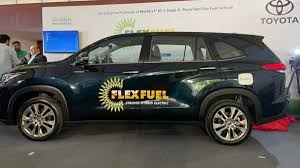How Phonepe became No.1 Friendly user UPI App in India
February 28, 2026
March 1, 2026,3:44:46 PM

Toyota Motor has revealed an innovative vehicle, marking a significant milestone in the automotive industry by introducing the world's inaugural fully ethanol-powered car with a versatile flex-fuel engine. This cutting-edge model, based on the well-received MPV Innova HyCross, had its official debut on August 29. The launch event was graced by the presence of Union Minister Nitin Gadkari.
Of notable interest is the electrified flex-fuel version of the Innova HyCross, which not only operates on an alternative ethanol-based fuel but also possesses the capability to generate its own electric power, allowing it to function in an electric vehicle (EV) mode. This prototype of the electrified Innova HyCross flex-fuel adheres to the most recent emission standards, specifically Bharat Stage 6 (Stage 2).
Distinguished by its exclusive reliance on ethanol, a plant-derived fuel referred to as E100, the Toyota Innova HyCross flex-fuel MPV is further enhanced with a lithium-ion battery pack. This advanced battery system provides ample power to enable the vehicle to seamlessly switch to EV mode. The commercial availability date for the electrified Innova HyCross flex-fuel production variant is currently pending confirmation.
In comparison to the hybrid edition of the Innova HyCross available in the Indian market, the flex-fuel iteration introduces subtle distinctions. The Innova HyCross hybrid variant boasts a 2.0-litre 4-cylinder petrol engine, generating 181 bhp, delivering a fuel efficiency of 23.24 kmpl. This powertrain is paired with an e-CVT transmission.
Union Minister Nitin Gadkari has been an unwavering advocate for embracing alternative fuels, as a strategic measure to mitigate the substantial costs associated with crude oil imports, which serve as the basis for conventional fuels like petrol and diesel. The adoption of alternative fuels is also geared towards combatting pollution and consequently lowering India's carbon footprint. At the launch event, Gadkari underscored, "Vehicular pollution contributes to 40 per cent of pollution in our nation, with Delhi residents bearing a particularly heavy burden due to vehicular emissions."
In the preceding March, Toyota Motor had introduced India's inaugural all-hydrogen electric vehicle, known as the Mirai. This was realized through a collaborative initiative with the International Center for Automotive Technology (ICAT). The Toyota Mirai FCEV represents a pioneering leap in hydrogen fuel cell electric vehicles on a global scale. Its operation relies solely on electricity derived from pure hydrogen, making it a true zero-emission vehicle, emitting only water vapor from its exhaust.
![]()
The Mechanics of Ethanol-Powered Flexible Fuel Cars Flexible fuel vehicles (FFVs) are designed with internal combustion engines, engineered to run on either gasoline or any blend of gasoline and ethanol, up to a composition of 83%.
The nomenclature "E85" designates the official blend for flex-fuel vehicles, encompassing 85 percent ethanol fuel and 15 percent gasoline or other hydrocarbons by volume.
Bio-ethanol exhibits a lower energy density per liter compared to petrol; however, advancements in technology are progressively bridging this gap in calorific value (energy content) between bio-ethanol and petrol.
With the capability to function on both petrol and ethanol, FFVs embody a groundbreaking class of vehicles, representing the first 100 percent dual-fuel automobiles to grace Indian roads.
Ethanol, a by-product of sugar production, emerges as a promising alternative to petrol as a fuel mixture. Its attractiveness lies in its domestic production potential from crops, positioning it as a more economical choice than petrol, which necessitates costly crude oil imports. Noteworthy car manufacturers in India, including Maruti Suzuki, Tata Motors, Toyota, Honda, Mahindra and Mahindra, are progressively transitioning to ethanol-blended fuel as part of their strategy to lower emissions and align with governmental regulations.
© 2024 Iconsofindianbusiness.com. All Right Reserved.